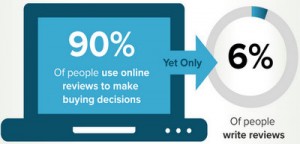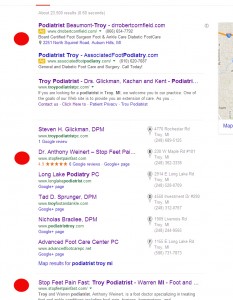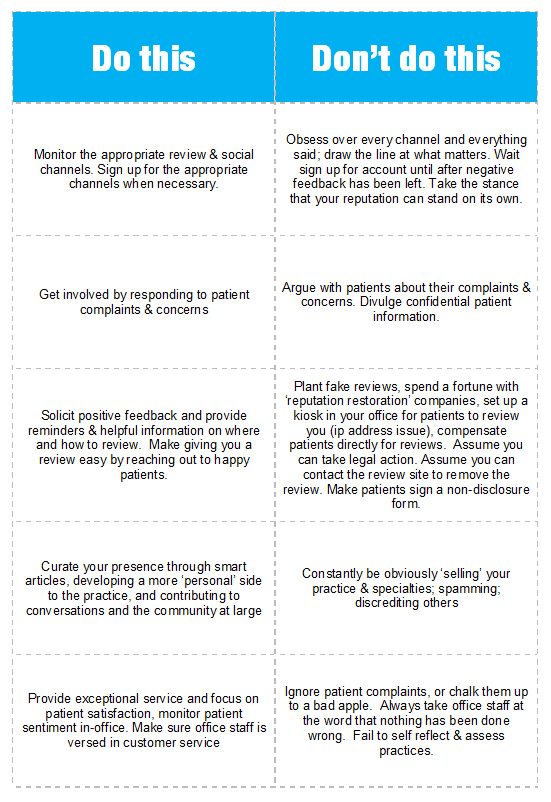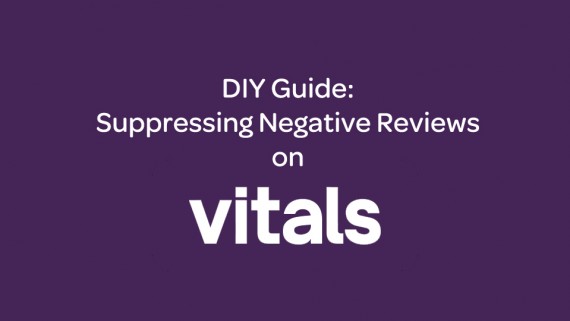Physician Online Reputation Management: The Importance of Getting Involved
Your online reputation as a physician is crucial, probably even more so than you may realize. The Internet has opened up the door to allowing people to access info on your practice and yourself, but by the same token it has made it possible for there to be fraudulent information and provided a perfect outlet for negative reviews, all of which can do massive damage. Physician online reputation management has become so important because patients are increasingly relying on online reviews in their decision making process, sometimes even weighing their importance more heavily than their PCP’s referral.
Damage Potential for Physicians Ignoring Online Reputation Management
As of 2012, about one-third of patients who viewed online sites sought out or avoided physicians based on their ratings. The findings come from a nationally representative Internet-based survey of 2,137 adults, published Feb. 18 in JAMA. “Patients are increasingly turning to online physician ratings, just as they have sought ratings for other products and services,” wrote the study’s authors, led by Dr. David Hanauer, a pediatrician and associate professor at the University of Michigan. A more recent Pew Research Center study indicates that 72% of all U.S. internet users looked online for health information in 2012; 30% of them have looked specifically at provider reviews, where anyone can write anything under a near guarantee of anonymity. More than 700,000 physicians are listed on Vitals.com, the largest of the patient review sites, which attracts more than 13 million visitors a month. ZocDoc.com, RateMDs.com, and Yelp.com maintain sizable directories of provider information.

A screen-capture from my personal newsfeed on Facebook illustrates the sort of discussions that take place on social media about doctors. A casual request for a recommendation of a pediatric ophthalmologist lead to 11 people chiming in, and a negative experience at a pediatrician garnered a huge discussion and awareness of the experience.
Internet access and familiarity with review sites and online searches has increased, leading more people to look up their doctor or dentist online. Patients can leave reviews on their phone via apps like Yelp & Foursquare, or on map listings like Google Maps. They can also access those listings rapidly when making a decision on what practice to visit. Potential patients overwhelmingly consult review sites and the personal opinion of social media connections before committing to seeing a certain physician, and sometimes a strong negative review snowball into an all-out boycott of a practice.
“I’m the best in my field. I don’t have to worry about asking for reviews, because everyone already knows me.”
Cream does still rise to the top, and being acknowledged by your peers as the best at what you do goes a long way toward securing referrals and a steady stream of new patients. Most specialists we speak to wave off the issue of reputation management by repeating this phrase, or citing positive patient survey results wherever they have hospital privileges. However, it’s become abundantly clear that referrals aren’t made solely based on the clinical skill of the physician being referred to. Michael Kirsh, MD outlines 7 reasons, beyond medical quality, why certain medical specialists are chosen for a referral:
- Availability trumps clinical acumen almost every time for physicians who want their patients seen expeditiously. Added benefit? Those patients are much more inclined to be satisfied with the referral, and thus the referring physician as well.
- Reciprocity –- patients are referred in both directions
- Personal relationships
- Corporate enforcement keeping consultations within the network
- Specialist willingness to do tests and procedures on request
- Habit
- Patient or family request
That last one is especially important to note, because those patients & family requesting a referral to a specific physician/practice aren’t picking the name out of the air. Maybe it’s because where they want to go is the ‘best’, or maybe it’s because that’s the physician that went on the news and talked about cardiology in a way that resonated with them. Maybe it’s because they did a simple google search for doctors treating their disease and saw one that stood out with superior online reviews and an overall solid presence.
Physician practices have been hurt so badly by negative online reviews that some have opted to open a lawsuit against the reviewer- often losing the battle, and gaining more negative press in the process. Internet savvy patients with an ax to grind can wreak havoc by fraudulently claiming local listings, impersonating the practice online, or using the mechanics of search engine optimization to ensure that their negative opinion of the doctor is the top result when searching for that physician’s name. Because HIPAA compliance ensures you can’t discuss details of the interaction with the patient in a public forum, fighting negative allegations is difficult if not impossible.
Why Do Bad Reviews Happen?
Why do bad reviews happen? Because people are passionate about negative experiences, and are motivated by several fundamental desires:
- A need for vindication after being ‘wronged’
- The desire to warn others or be helpful
- To be heard and/or have the situation rectified
- The desire to validate other negative reviews, or ‘pile on’ to the popular sentiment bandwagon
To put it in perspective, ask yourself: are you more likely to leave a review after having a normal, but pleasant experience at a restaurant… or after having a horrible experience? Most people answering truthfully will agree that the horrible experience will prompt them to ‘take action’, so to speak. That action, especially when presented with a scenario where they’re either uncomfortable with addressing the business in person, is usually a scathing, anonymous review.

“The brain handles positive and negative information in different hemispheres,” said Professor Nass, who co-authored “The Man Who Lied to His Laptop: What Machines Teach Us About Human Relationships” (Penguin 2010). Negative emotions generally involve more thinking, and the information is processed more thoroughly than positive ones, he said. Thus, we tend to ruminate more about unpleasant events — and use stronger words to describe them — than happy ones.
Roy F. Baumeister, a professor of social psychology at Florida State University, captured the idea in the title of a journal article he co-authored in 2001, “Bad Is Stronger Than Good,” which appeared in The Review of General Psychology. “Research over and over again shows this is a basic and wide-ranging principle of psychology,” he said. As the article, which is a summary of much of the research on the subject, succinctly puts it: “Bad emotions, bad parents and bad feedback have more impact than good ones. Bad impressions and bad stereotypes are quicker to form and more resistant to disconfirmation than good ones.”
Good vs Bad Online Review Statistics:
- 2012 survey found that on average, a person will tell 24 people about a bad customer service experience they have – this is up 50% from 16 in a 2011 survey, and only set to increase with the pervasive nature of sharing on social sites & access to the internet.
- More than 8 in 10 consumers have bailed on a purchase because of a poor service experience compared to 55% overall. This translates almost directly to patients avoiding a physician office as well, particularly due to the heightened emotions and importance placed on good healthcare.
- It is estimated that good reviews can boost a business’s sales anywhere from 32 percent to 52 percent, according to the Harvard Business Review. So it stands to reason that a practice with poor reviews will in turn lose current customers, or fail to attract new ones.
Leana Wen, M.D., author of When Doctors Don’t Listen and director of patient-centered care research at George Washington University, says instances of excessive browbeating online could be avoided if physicians would take time to have a dialogue with their patients. “When doctors don’t pay attention, those review sites become the third party,” Dr. Wen says. “There’s a lack of focus in the medical educational system in communication. It’s common for a patient to feel disenfranchised, to not feel as though they know what’s going on with their own body.” According to Wen, around 80% of medical diagnoses come from simply talking to the patient. “It’s a partnership,” she says. “In many cases, the doctor has no idea the patient is this unhappy.” Additionally, patients who had a mediocre or questionably negative experience seek that third-party validation, and when they find negative reviews, it’s a sort of “a-ha!” moment. Those patients will feel MORE negative about their experience simply by reading other negative experiences, and are much more likely to add their own negative review.
I call this the Snowball Effect: There’s a point in any group where, after some individuals agree with the minority, the minority then turns into the majority. People feel much more comfortable expressing a negative opinion when they feel supported, bolstered, and part of a larger group of individuals expressing a similar negative opinion. The goal of reputation management is to mitigate or minimize the chances of negative reviews snowballing out of proportion. This is achieved by increasing positive reviews, essentially creating an environment where the patient who might feel poorly about their recent experience is more likely to consider it a fluke, rather than the norm, and less likely to report it.
Where Should Physicians Focus Their Efforts?
Where should a physician & practice focustheir efforts? This is an ever changing target primarily based on internet user favor and online search visibility. When determining where you should focus your efforts, you need to consider the following:

Searches via phone often show reviews from either Google+ or Yelp, and are a major factor in whether the searcher will click on your website or call your practice.
- Where are patients looking for physicians & reviews? (rateMds, Vitals, Healthgrades)
- Which sites are ranking well within search results/ have high visibility? (Google+ local, Yelp)
- On what high-visibility sites can you control the message? (Facebook, Google+, social channels)
Your local online visibility is tied to active reputation management. By managing your reviews and soliciting them to be placed on sites that rank well within searches for your niche, you will be improving your ranking within search engines like Google. At PRM, our physician online reputation management focuses on driving reviews to Yelp & Google+ local map listings: these sites readily show up in Google search results, as well as in map results when an individual searches verbally on their phone (think Siri and the iPhone). Maintaining a positive “5 Stars” review profile on high-visibility sites if vital to attracting new patients online.

People look at 3 spots in a typical Google search, indicated by the red dots in my screen-capture: the Google Adwords paid ads (which, increasingly, people skim over and distrust), the Google+ local results, and the organic results. When looking at this screen-capture, ask yourself where you would click: heatmaps show that most people opt to click on the listing with a high star rating.
Potential patients & current patients often search by physician name after being referred or having recently seen that physician. Websites like rateMDs, Vitals, & Healthgrades come up rather consistently when a search is made for a specific physician name. Part of your online review strategy should focus on directing patients to leave some reviews there.
Websites like ZocDoc & Demandforce allow you to ‘control the message’ completely, by pushing reviews into their own system that allows you to reject negative reviews. While this sounds great (“I just won’t approve negative reviews!”), it’s a weak tactic. Those sites don’t rank very well in Google searches for most medical & dental niches, so they’re often not seen until AFTER the potential patient has had their first appointment and gotten into your marketing queue. You’re much better off pushing patients to review you on sites that have high visibility, or sites where you’re actively controlling the message- your social media sites like Facebook & Google+.
Physician and practices should consider contracting with a physician online reputation management company to implement a consistent review solicitation & social media management strategy. Since lecturing on this topic at a few hospitals, I’ve found that healthcare practitioners are left at a severe disadvantage in the offerings for managed online reputation services. Sites like Reputation.com are frequently cited as preying on dental & physician groups, charging obscene amounts to manage reviews and ‘remove negative reviews’- something a legitimate company can’t do, unless they’ve negotiated with the original poster (which, rest assured, Reputation.com does NOT). These groups that sign up with groups like that often end up in a position where they feel blackmailed to stay on with them, often being contacted with a sudden increase in negative online reviews after terminating services, and sometimes even after initially contacting them for a price quote. I urge physicians & dentists to read some of their reviews on RipoffReport before ever contacting them.
What Should Physicians Do? What Shouldn’t They Do?
What can physicians do to protect their brand & credibility?
- Monitor the appropriate channels. Set up a Google alert (though this won’t catch everything) for you name, practice name, location, website, etc. Can set to report ‘as it happens’; can also set to monitor specific websites where someone
might be talking about you. Sign up for physician review sites before negative feedback has been left, if possible.
- Get involved. There are very few cases where you don’t want to respond at all, most negative reviews can be slightly mitigated by responding and showing concern. Be honest, be genuine, be helpful. Steer the conversation off public forums when personal details are being divulged, or when things can easily be addressed.
- Solicit positive feedback. Ask for good reviews, and provide the sites and directions for where & how to leave them. Make it easy- a taken away sheet is good, email forms that link directly are great.
- Curate your presence. Develop informational articles and share. Take pictures of the office & staff to make your presence more ‘personal’. Contribute to forums & conversations about applicable medical topics. Show goodwill efforts in the community & online (example: an “ask the doctor” post is showing online community goodwill)
- Provide exceptional service. This includes the physician and the staff; always be thinking about the end goal of a happy patient- happy patients are more likely to return, refer, and recommend (review). Regular patient feedback surveys are fantastic tools, but ONLY if they are taken to heart when a pattern is identified. Make sure office staff is versed in customer service, including appropriate answer times on phones, manners/bedside manner, interactions with patients (story: phone manners of oral surgeon office); consider customer service coaching programs when feedback is negative.
Most of all, physician practices should understand that negative reviews happen even to the best businesses. While you can’t please everyone, you can leverage those who are happy with their experience to offset those who will never be satisfied.
An Opportunity for Growth:
As awareness and use of physician review sites continues to increase, online reputation management for doctors has become vital. You can’t stop reviews from happening, so by embracing online reputation management as a crucial component of practice management, physicians can make it work for them.
Physicians should see online reviews as an opportunity for growth:
- The feedback of happy patients can encourage new/potential patients to select one physician over another; vital as patients are becoming more proactive in physician selection, even at specialist levels.
- Curating your presence helps you draw the patients that you’ll enjoy working with; ie. Reviews and articles focused on treatment for diabetic neuropathy will help you attract those kinds of patients.
- Increase online visibility & strengthen overall SEO and SEM efforts (search engine optimization and search engine marketing efforts). Review sites are becoming more visible as more people use them, and some factor into mobile search results in maps and through voice searching (yelp and Google+). These are crucial components of an overall online visibility strategy.
- The negative feedback of patients allows you to address potential failings before they become routine or habitual. Analogy: it’s easier to correct a dog from jumping on your furniture when they first do it, rather than 10 years after sleeping on the sofa daily. Bad staff members and practices are pervasive and can perpetuate even after the initial offender has been addressed.
Right alongside your marketing and referral generation efforts, your online review management & solicitation is a pillar of your practice health & patient acquisition. Embrace the future by developing a strong online reputation today for a better practice tomorrow.






Loving this Laura!! I follow you on Linkedin and enjoyed the preview, but this has so much more information and takeaway tips.